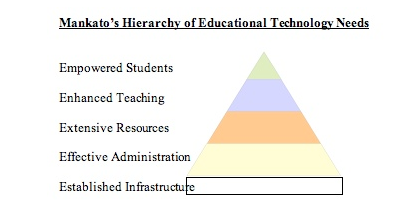Top 10 things I've learned about long-range plans
 Tuesday, November 6, 2018 at 05:48AM
Tuesday, November 6, 2018 at 05:48AM  It's that time again. Yes, boys and girls, time to write a new multi-year technology plan for the district!
It's that time again. Yes, boys and girls, time to write a new multi-year technology plan for the district!
OK, OK, quiet down. I know you're excited, but we have some real important work to get done here. Now, who would like to help?
Please let's not all raise our hands at the same time. I understand that everyone wants to be associated with the most important, impactful document in the district, but the meeting room just won't hold us all. Many of you will just have be content taking the survey and participating in focus groups.
Please don't cry.
I'm sure that your experience is similar to that described above when one begins writing a long-range technology plan. (Joke.) As technology and library director, it's been both my pleasure and my pain to be involved in the construction of plans for both the districts in which I've been employed and for districts which have hired me as a consultant. One of the tasks for which I am responsible this year is coordinating the construction of my district's next three-year plan.
In preparation, I've been reflecting on what I've learned about long-range plans for libraries and technology programs over the past 25 years or so. Here are my top 10...
1. Plans should direct, not dictate. A good plan should specify general directions in which the district wants to move and not be overly prescriptive. Specifics should be a part of each year's articulation of annual objectives. (See #4 below.) Specific technologies (and educational practices) change too rapidly to write a tech plan that indicates a particular device multiple years into the future.
2. Plans need interdepartmental ownership. A good plan can be a silo buster if leaders in curriculum, PD, business, operations, etc. are involved in its construction. Actually, I often think an argument can be made that there be no separate "technology" plan, only sections of other departmental plans that address technology.
3. Plans need to input from stakeholders. Needs surveys. focus groups, listening sessions at staff and parent meetings all provide plan developers with much needed perspective of the end user of any technology initiatives. Yes, we are the "tech" experts - but not the experts in teaching, accounting, etc.
4. Plans are worthless without annual objectives and accountability. In my experience, if long-range technology plans are to have any impact, annual objectives must be written based on them. AND the annual objectives need to be used as a performance measure for the individual responsible for seeing them completed.
5. Plans should address multiple levels of technology use in schools. I've long advocated a hierarchical approach to technology planning. In Maslow and Motherboards, I identified these pieces of a technology plan. Still works for me, but your mileage may vary.

6. Plans should be short and understandable. The longer the plan, the less likely it is to be read. Period. If a long, complex plan is necessary, it needs to be accompanied by an executive summary. The plan should not assume everyone knows technology or educational acronyms or the function of a particular piece of technology.
7. Plans should reflect realistic budgets. While it is fun to dream, a plan that requires immense additional funding without considering the source of that funding is not much good. I like aspirational plans that describe the pedagogical uses of technology, but if these aspirations depend on state legislatures mysteriously appropriating categorical funding toward classroom technologies, the plan will be more frustrating than useful.
8. Plans can save a program. Budget reductions are a reality for many districts. A good technology plan can, however, help minimize the impact of budget reductions on technology implementations. If the district wide infusion of a technology is spread over 3 year, cutting funding the final year will be objectionable to those who have been patiently waiting their turn for funding.
9. Plans should be about positive change. Larry Cuban in Questions to Ask in Making Changes in Schools and Classroom lists as his first: "What are the problems you want to solve?" Planning time is a great time to ask why we might be considering a new program or technology. Are we trying to actually solve a real problem or we jumping on a bandwagon? And is technology the best means of solving it? Good tech planning is not just deciding what the district will do, but what it will not do.
10. Add your hard learned lesson. Use the comment section below.
I have yet to create or see a perfect plan. Maybe I only need 25 more years and I'll have it figured out.
Blog posts
Directions for the next tech plan, September 15, 2010
Men plan, god laughs. April 30, 2012
Strategic planning for libraries Dec 3, 2008
The real tech plan, May 10, 2006
Articles
Using Planning and Reporting to Build Program Support, Book Report May 1992
What Gets Measured Gets Done, 2007
Maslow and Motherboards: Taking a Hierachical View of Technology Planning MultiMedia Schools, January/ February 2003.









Reader Comments